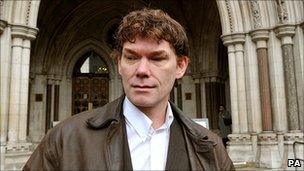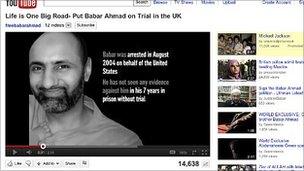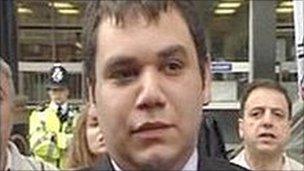UK extradition laws: Key cases
- Published
A coalition government review into extradition law was led by Sir Scott Baker, a former Court of Appeal judge. It looked at extradition arrangements to the US and the European Union, which are covered by two separate pieces of law.
The key issues included:
The fairness of the Extradition Act 2003 (covering the US) and the European Arrest Warrant
Whether the country asking for someone to be extradited should provide evidence to be tested first in the British courts
Whether the UK should bar extraditions where offences have been largely committed in the UK.
Here are some of the recent cases that have raised questions about extradition:
GARY McKINNON: THE HEALTH ISSUE

Gary McKinnon has been fighting extradition to the US for several years
The home secretary has blocked the extradition of Gary McKinnon, whom the US authorities wanted to extradite for alleged hacking of US military computer systems.
Glasgow-born Mr McKinnon, who has Asperger's syndrome, faced up to 60 years in jail for hacking into Pentagon and Nasa computers between February 2001 and March 2002.
The 45-year-old, who lives in north London, does not deny hacking into the systems but insists he was seeking evidence of UFOs.
The US decided to indict Mr McKinnon after he was arrested in 2002, although extradition proceedings did not begin until 2005.
He appealed unsuccessfully to the House of Lords and the European Court of Human Rights to avoid extradition.
His lawyers also lost an appeal for him to be prosecuted in the UK on lesser charges, with the Crown Prosecution Service saying the US was the best place for the case to be heard.
Campaigners said such a vulnerable person should not face trial in the US, for medical reasons.
There has been a long-running campaign for Mr McKinnon to be allowed to remain in the UK, and many politicians, including Deputy Prime Minister Nick Clegg, expressed concerns about the case.
BABAR AHMAD: ACCUSED OF OFFENCES IN UK - EXTRADITED TO US

Babar Ahmad: Campaign online by family
Babar Ahmad, an IT worker from Tooting in south London, was held in jail for more than eight while contesting extradition to the United States. He finally lost in October 2012 and was flown to the US to face trial in in late 2013.
His family says that if he had committed crimes he should be tried in the UK. Their campaign to have him tried in a British court became one of the top 10 e-petitions on the official government website, external.
US investigators accuse Mr Ahmad of running online fundraising operations for jihadists in Chechnya and Afghanistan. He was arrested for extradition in 2004 - but only after Scotland Yard had arrested and released him without charge months earlier.
Parliament's Joint Committee on Human Rights has called for the US-UK treaty to be renegotiated to prevent people like Mr Ahmad being extradited if the British authorities have already decided not to prosecute someone for an offence based on the same evidence. However, the British authorities say that the charges he faces in the US are different to those that were considered in the UK.
The key link between Mr Ahmad and the US is that the website he ran was based in on servers in Connecticut. Parliament has passed a law, known as the "forum bar", which could be invoked to prevent people being tried abroad for offences which should be prosecuted in the UK. The measure has never been brought into force.
Mr Ahmad's co-accused, Talha Ahsan, also argued that he should not have neen extradited because he ha Asperger's Syndrome, like Gary McKinnon.
CHRISTOPHER TAPPIN: CLAIMS OF UNFAIR ALLEGATIONS
The case of retired businessman Christoper Tappin, extradited in February 2012, is very complex - but basically comes down to an allegation that the British importer was part of a conspiracy to supply American batteries without export licences that were ultimately bound for Iranian missiles.
Christopher Tappin: "I looked to Mr Cameron to look after my rights and he failed to do that"
He vehemently denies the claim and says that he was entrapped by US law enforcement agencies who were acting unlawfully. He says he should never had been charged in the first place because US law says that the exporter is responsible for licences, not an importer like him.
The Home Secretary and the British courts upheld the extradition request - and the European Court of Human Rights refused to intervene.
In its ruling, the Court of Appeal in London found , externalthat it did not need to consider detailed arguments about US export rules because it was clear that the US had accused Mr Tappin of offences comparable to those found in English law.
It also dismissed Mr Tappin's allegations of entrapment and said it had to assume the US request had been made in good faith, unless there was particularly strong evidence to the contrary.
JULIAN ASSANGE: A LAWFUL REQUEST?

Mr Assange's case is being considered by the Supreme Court
Julian Assange, the founder of the Wikileaks website, fought and lost a battled against extradition to Sweden in the UK's Supreme Court. He is wanting for questioning in relations to allegations of sexual assault, which he denies. He then fled to the Ecuadorian embassy in London, seeking political asylum.
His appeals against extradition failed at every key stage in the lower courts and the Supreme Court knocked out his final narrow argument relating to whether the European Arrest Warrant was made out by the right person.
His lawyers told the Supreme Court judges the Swedish prosecutor who issued his European Arrest Warrant did not have the authority to do so.
Mr Assange's supporters say he risks extradition to the US and they want guarantees from Sweden that it would not transfer him onwards. Sweden says it cannot give such a guarantee because there has been no request - and critically it would be for the courts to decide its merits if and when it comes.
ANDREW SYMEOU: QUALITY OF EVIDENCE

Andrew Symeou said he was not in the club at the time of the killing
Andrew Symeou was cleared two years after he was extradited to Greece in July 2009 to face manslaughter charges in connection with the death of Jonathan Hiles at a nightclub on the Greek island of Zakynthos.
Mr Hiles, 18, from Cardiff, who was on holiday in July 2007 when he fell from a dance podium, died from a brain injury.
Mr Symeou, 22, from Enfield, north London, was accused of punching the teenager in the face, knocking him out in the process and causing him to fall from the podium.
He had denied being in the nightclub at the time.
In 2009, Mr Symeou was extradited to Greece under the European Arrest Warrant.
He spent 10 months in a Greek prison and became the subject of a campaign to free him by the charity Fair Trials International, with the charity saying much of the apparent evidence against him was based on details obtained by Greek police officers who intimidated witnesses.
On 17 June 2011, the jury found Mr Symeou not guilty. Mr Hiles' father, Denzil, has said he will appeal against the decision.
MIKOLAJ KOWALSKI: PROPORTIONALITY
According to Fair Trials International, Mikolaj Kowalski - not his real name - a Polish schoolteacher and grandfather who lives in Bristol, was sought on an European Arrest Warrant in 2010 to face trial for "theft" in Poland in 2000.
The charity said the alleged offence referred to a period when Mr Kowalski withdrew money from his bank taking him over the agreed overdraft limit, but the entire debt was repaid to the bank after it repossessed and sold his home.
In 2004, Mr Kowalski moved with his family to the UK.
But on 23 July 2010, Fair Trials International said he was arrested by British police and threatened with a criminal trial for a debt he paid off many years ago.
It said Mr Kowalski, who has numerous health problems, was very worried about being sent to prison in Poland and being separated from his family, including his wife who cares for him.
In April 2011 the English court decided Mr Kowalski's extradition should not go ahead due to his health problems, but the EAW remains in place and he is unable to leave the UK.
NATWEST THREE: FIRST MAJOR CHALLENGE
The Natwest Three were British bankers extradited to the US on charges linked to the Enron fraud case in the first long battle against extradition following the US-UK treaty.
US prosecutors issued arrest warrants for the three men, accusing them of conspiring to defraud their employers and investors in collapsed US energy giant Enron.
They alleged they were involved in a fraud in which their employer, Greenwich NatWest, was advised to sell off its stake in an Enron subsidiary at well below its market value.
The men fought the case saying that the British courts were not allowed to properly test the evidence behind the extradition request.
The men ultimately lost and were flown to the US. In 2008 they pleaded guilty in a plea bargain to one count of wire fraud and each received sentences of 37 months.
- Published22 June 2011
- Published8 September 2010